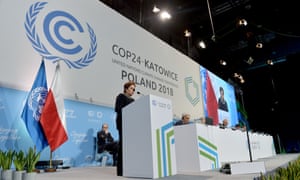New Zealand urges others not to meet emissions pledge with ‘dodgy
accounting’, but UN rules unlikely to prohibit using carryover credits
Australia appears likely be allowed to exploit a controversial climate loophole, using carryover carbon credits from the Kyoto protocol to meet its Paris agreement targets.
New Zealand has already ruled out using the carryover credits, saying it would discourage other countries from the practice.
Australia’s environment minister, Melissa Price, said Australia would meet its Paris commitment of a 26% to 28% carbon emissions reduction – “equivalent to a halving of emissions per person” – but would not comment on whether the government would use carryover credits from Kyoto to reach that target.
New Zealand’s climate change minister, James Shaw, said this week the practice of claiming credits was not in the spirit of the Paris agreement, and “we would discourage any country from using [it]”. He has previously described the practice as “dodgy accounting” and like “trying to have two meals for the price of one”.
The use of carryover credits is one of dozens of technical elements
being negotiated at the UN climate talks in Katowice, Poland where 193
countries have gathered to negotiate the “rulebook” for each meeting the
emissions reductions targets made three years ago in Paris.New Zealand has already ruled out using the carryover credits, saying it would discourage other countries from the practice.
Australia’s environment minister, Melissa Price, said Australia would meet its Paris commitment of a 26% to 28% carbon emissions reduction – “equivalent to a halving of emissions per person” – but would not comment on whether the government would use carryover credits from Kyoto to reach that target.
New Zealand’s climate change minister, James Shaw, said this week the practice of claiming credits was not in the spirit of the Paris agreement, and “we would discourage any country from using [it]”. He has previously described the practice as “dodgy accounting” and like “trying to have two meals for the price of one”.
Most of these additional carbon credits have been won through Australia’s unique deal under Kyoto to count land-clearing changes towards emissions reductions.
Having those credits already “banked” against Australia’s emissions reduction target would make meeting its 2030 Paris goal of a 26% to 28% emissions reduction significantly easier: closer to 15% in actual reductions, Climate Analytics has said.
Government figures show the Australia’s carbon emissions continue to rise. Emissions from fossil fuels and industry have been increasing by about 2% a year since 2014.
At the UN climate change talks in Poland this week, the Marshall Islands has raised objections to the use of carryover credits in informal negotiations, but with little support.
Preliminary documentation from inside the talks, seen by Guardian Australia, suggest that using carryover credits is not going to be prohibited under the “rulebook” for the Paris agreement, meaning countries will be able – and some likely – to do it.
The chief executive of Climate Analytics and a lead author on former IPCC assessment reports Bill Hare said it appeared almost inevitable Australia would be allowed to – and would – use carryover credits. A change of government would not change the policy, he said.
“Every indication is that both the government, and the Labor party, have every intention of trying to carry over surplus credits from the Kyoto protocol into Paris.
“The [Australian government] delegation has made statements at negotiations over a period of time that are consistent with that.”
Hare said Australia, based on its current climate policies, could not meet its Paris agreement target without using surplus credits. He described the use of carryover credits as “fake climate action”.
“About half of the cumulative abatement task from 2021 to 2030 could be met by the projected Kyoto second commitment period surplus … in other words, the overall mitigation effort to reach the already inadequate target would be halved.”
Along with New Zealand refusing to use its credits, other countries have previously declined to use theirs. In 2015, Denmark, Germany, the UK, Sweden, and the Netherlands cancelled 635m tonnes of carbon credits.
In Katowice, Price told Guardian Australia that the government was committed to the Paris Agreement and its targets.
“Our priority at COP 24 is to secure agreement on a comprehensive rulebook to guide the implementation of the agreement.
“Our 2030 target is to reduce emissions by 26 to 28% below 2005 levels, which is equivalent to a halving of emissions per person. The government is confident of meeting this target, based on our track record of meeting and beating our first and second Kyoto protocol targets.”
Australia, however, has consistently won specific exemptions to the calculation of its carbon reductions targets over decades of climate negotiations.
During negotiations over the Kyoto protocol, the Howard government negotiated a special deal, allowing it to actually increase emissions by 8% between 2008 and 2012.
An additional article negotiated in the dying hours of the conference – known as the “Australia clause” and condemned at the time by a European environment spokesman as “wrong and immoral... a disgrace” – allowed Australia to include land use changes in its emissions calculations which meant the target could be reached with only minor changes to land-clearing laws.
When Australia met – and exceeded – its first Kyoto target, it was able to bank those extra carbon credits, carrying them over to meet its second target for 2020. That excess appears now likely to be calculated in assessing its Paris commitment.

No comments:
Post a Comment